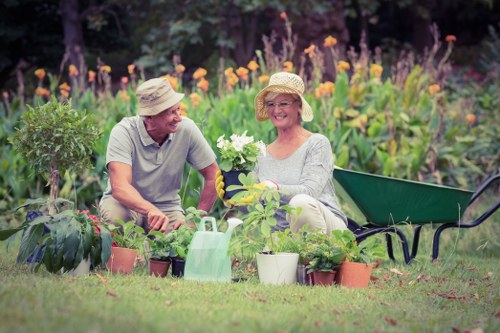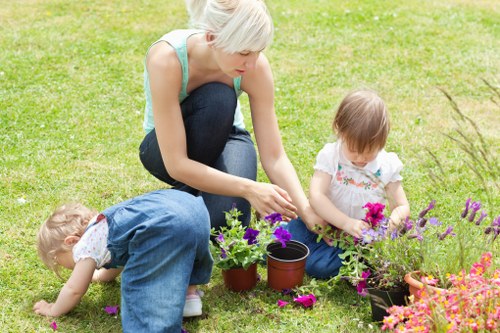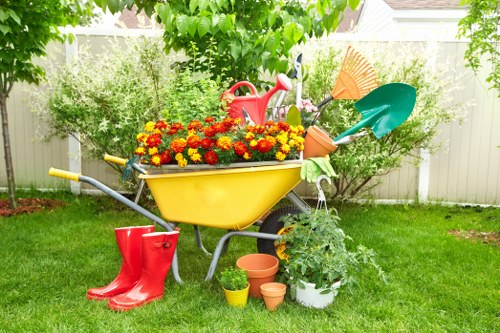Enhancing Outdoor Spaces: The Role of Garden Landscapers in Landscape Gardening
Introduction to Garden Landscaping

Creating a beautiful and functional outdoor space requires more than just planting flowers and shrubs. It involves careful planning, design, and maintenance to ensure that the garden not only looks aesthetically pleasing but also serves the needs of its users. This is where garden landscapers come into play, transforming ordinary gardens into extraordinary landscapes.
Garden landscapers are professionals who specialize in the art and science of garden design and maintenance. They possess the knowledge and expertise to create harmonious outdoor environments that complement the natural surroundings and the architectural style of the property.
Whether you're looking to revamp your backyard, create a serene garden retreat, or design a vibrant public park, landscape gardeners have the skills to bring your vision to life.
The Importance of Professional Garden Landscaping

Investing in professional landscape gardening offers numerous benefits that go beyond mere aesthetics. A well-designed garden can enhance property value, improve environmental quality, and provide a peaceful sanctuary for relaxation and recreation.
One of the key advantages of hiring garden landscapers is their ability to optimize the use of space. They can assess the unique characteristics of your property, including soil type, climate, and existing vegetation, to design a garden that thrives in its specific environment.
Moreover, professional landscapers can incorporate sustainable practices into their designs, such as using native plants, efficient irrigation systems, and eco-friendly materials. This not only promotes biodiversity but also reduces maintenance costs and environmental impact.
Services Offered by Garden Landscapers

- Design and Planning: Creating detailed garden designs that align with the client’s preferences and site conditions.
- Installation: Implementing the garden plan, including planting, hardscaping, and installing irrigation systems.
- Maintenance: Regular upkeep to ensure the garden remains healthy and visually appealing.
- Consultation: Providing expert advice on plant selection, pest management, and sustainable gardening practices.
These services ensure that every aspect of garden creation and maintenance is handled with expertise and professionalism, resulting in a space that is both beautiful and functional.
Additionally, garden landscapers often collaborate with other professionals, such as architects and builders, to integrate the garden seamlessly with the overall property design.
Design Principles in Landscape Gardening

Effective landscape gardening is grounded in fundamental design principles that guide the creation of balanced and harmonious outdoor spaces. These principles include:
- Unity: Ensuring all elements of the garden work together to create a cohesive look.
- Balance: Achieving visual equilibrium through the arrangement of plants, structures, and other features.
- Scale and Proportion: Selecting elements that fit the size and shape of the garden.
- Focal Points: Designing areas that draw attention and create interest.
- Rhythm: Creating patterns and repetition to guide the eye through the garden.
By adhering to these principles, landscape gardeners can design gardens that are not only visually appealing but also functional and sustainable.
Implementing these design elements requires a deep understanding of both aesthetics and horticulture, which professional garden landscapers possess.
Choosing the Right Plants for Your Garden

One of the most critical aspects of landscape gardening is plant selection. The right plants can enhance the beauty of the garden, provide shade and privacy, and support local wildlife. Garden landscapers are skilled in selecting plants that not only thrive in the local climate but also complement each other in terms of color, texture, and form.
When choosing plants, landscapers consider factors such as sunlight exposure, soil conditions, water requirements, and maintenance needs. They often recommend native plants, which are well-adapted to the local environment and require less water and care.
In addition to aesthetic considerations, garden landscapers also focus on creating a sustainable ecosystem. This includes incorporating plants that attract beneficial insects, provide food for birds and other wildlife, and contribute to soil health.
Hardscaping Elements in Garden Design

Incorporating Paths and Walkways
Paths and walkways not only provide functional routes through the garden but also add structure and visual interest. Garden landscapers design these elements using materials that complement the overall garden theme, such as stone, gravel, or wood.
Choosing the Right Materials
The choice of materials for hardscaping elements depends on the garden’s style and intended use. For example, natural stone can create a rustic look, while concrete pavers offer a more modern appearance.
Maintenance and Durability
Durability and ease of maintenance are essential considerations when selecting materials for hardscaping. Professional landscapers ensure that the chosen materials are suitable for the local climate and will withstand regular use.
Water Features in Landscape Gardening

Water features, such as ponds, fountains, and waterfalls, add a sense of tranquility and elegance to gardens. They serve as focal points and can enhance the overall ambiance with the soothing sounds of flowing water.
Incorporating water features requires careful planning to ensure proper installation and maintenance. Garden landscapers have the expertise to design and implement water elements that are both beautiful and sustainable.
Additionally, water features can support local wildlife, providing habitat and attracting birds, insects, and other beneficial creatures to the garden.
Lighting in Landscape Gardens

Proper lighting can transform a garden, highlighting its features and extending its usability into the evening hours. Garden landscapers strategically place lighting to enhance pathways, plant beds, and architectural elements.
- Ambient Lighting: Provides overall illumination for safety and visibility.
- Accent Lighting: Highlights specific features, such as statues or focal points.
- Task Lighting: Illuminates areas designated for specific activities, such as outdoor kitchens or seating areas.
By integrating different types of lighting, landscapers create a dynamic and inviting outdoor space that can be enjoyed at any time of day.
Energy-efficient lighting options, such as LED fixtures and solar-powered lights, are often recommended to reduce energy consumption and environmental impact.
Eco-Friendly Practices in Landscape Gardening

Sustainability is a key consideration in modern landscape gardening. Garden landscapers implement eco-friendly practices to minimize environmental impact and promote biodiversity.
Some of these practices include:
- Using Native Plants: These plants require less water and are more resistant to local pests and diseases.
- Rainwater Harvesting: Collecting and using rainwater for irrigation reduces water consumption.
- Composting: Recycling garden waste into compost enriches the soil naturally.
- Reducing Chemical Use: Opting for organic fertilizers and pest control methods protects the ecosystem.
By adopting these sustainable techniques, landscape gardeners create gardens that are not only beautiful but also environmentally responsible.
Eco-friendly gardens contribute to the health of the planet by supporting local wildlife, improving air quality, and reducing the carbon footprint.
Seasonal Garden Maintenance

Maintaining a garden requires attention throughout the year. Garden landscapers provide seasonal maintenance services to ensure that the garden remains healthy and vibrant in every season.
Spring maintenance typically involves preparing the garden for the growing season, including soil preparation, planting, and pruning. Summer maintenance focuses on watering, weeding, and pest control to keep plants thriving.
Autumn maintenance includes clearing fallen leaves, planting bulbs for the next spring, and protecting plants against winter weather. In winter, landscapers may manage snow removal and prepare plants for dormancy.
Benefits of Hiring Professional Garden Landscapers
Hiring professional garden landscapers offers numerous advantages:
- Expertise: Professionals have the knowledge and skills to design and maintain gardens effectively.
- Time-Saving: They handle all aspects of garden creation and maintenance, freeing up your time.
- Cost-Effective: Proper planning and maintenance prevent costly mistakes and prolong the life of your garden.
- Enhanced Property Value: A well-designed garden can significantly increase the value of your property.
- Personalized Service: Landscapers tailor their services to meet your specific needs and preferences.
By entrusting your garden to professionals, you can enjoy a beautiful and functional outdoor space with minimal effort on your part.
Moreover, professional landscapers stay updated with the latest trends and techniques, ensuring your garden remains contemporary and stylish.
Trends in Landscape Gardening

Vertical Gardens
Vertical gardens are gaining popularity, especially in urban areas where space is limited. These living walls not only add greenery to buildings but also improve air quality and provide insulation.
Benefits of Vertical Gardening
Besides aesthetic appeal, vertical gardens maximize the use of vertical space, making them ideal for small balconies and patios. They also create a natural barrier against noise and pollution.
Designing Vertical Gardens
Successful vertical gardens require careful planning, including selecting suitable plants, ensuring adequate irrigation, and providing structural support. Garden landscapers can create customized vertical garden solutions that meet these requirements.
Choosing the Right Garden Landscaper

Selecting the right garden landscaper is crucial for the success of your landscape project. Here are some tips to help you make an informed decision:
- Experience: Look for landscapers with a proven track record and extensive experience in landscape gardening.
- Portfolio: Review their portfolio to assess the quality and style of their previous projects.
- References: Ask for references or read reviews to gauge client satisfaction.
- Licensing and Insurance: Ensure the landscaper is properly licensed and insured to protect against potential liabilities.
- Communication: Choose a landscaper who listens to your ideas and communicates clearly throughout the project.
By considering these factors, you can select a garden landscaper who aligns with your vision and can deliver exceptional results.
Additionally, obtaining multiple quotes and comparing services can help you find the best value for your investment.
Cost of Landscape Gardening

The cost of landscape gardening varies depending on the scope of the project, materials used, and labor involved. Garden landscapers typically provide detailed estimates that outline all expenses, ensuring transparency and helping you budget effectively.
Factors that influence the cost include:
- Design Complexity: Intricate designs with multiple elements may require more time and resources.
- Material Selection: High-quality materials and plants can increase the overall cost.
- Project Size: Larger gardens naturally demand more labor and materials.
- Additional Features: Incorporating water features, lighting, or hardscaping elements adds to the expense.
While investing in professional landscape gardening may seem costly initially, it can save money in the long run by preventing costly repairs and ensuring the longevity of your garden.
Moreover, a well-designed garden enhances the overall appeal and value of your property, making it a worthwhile investment.
DIY vs. Professional Landscape Gardening

While some homeowners opt for DIY garden projects, hiring professional garden landscapers offers distinct advantages. Professionals bring expertise, efficiency, and creativity that can be challenging to achieve independently.
- Expert Knowledge: Professionals understand plant behavior, soil health, and design principles, ensuring a thriving garden.
- Time Efficiency: They can complete projects faster, allowing you to enjoy your garden sooner.
- Access to Resources: Professionals have access to specialized tools and materials that may not be readily available to DIY enthusiasts.
- Creative Designs: Landscape gardeners can offer innovative design solutions that elevate the aesthetic appeal of your garden.
However, DIY projects can be rewarding and cost-effective for those with the necessary skills and time. It ultimately depends on your goals, budget, and commitment to maintaining your garden.
For best results, consider consulting with a professional landscaper to plan your project, even if you intend to handle some aspects yourself.
Conclusion

A well-designed and maintained garden enriches your living environment, offering beauty, tranquility, and a connection to nature. Professional garden landscapers play a pivotal role in achieving these outcomes by combining artistic vision with practical expertise.
From initial design and plant selection to installation and ongoing maintenance, landscape gardeners ensure that every aspect of your garden is thoughtfully planned and executed. By investing in professional landscaping services, you can transform your outdoor space into a stunning and sustainable oasis that enhances your quality of life and the value of your property.
Contact us today to start designing your dream garden with our expert landscape gardeners!